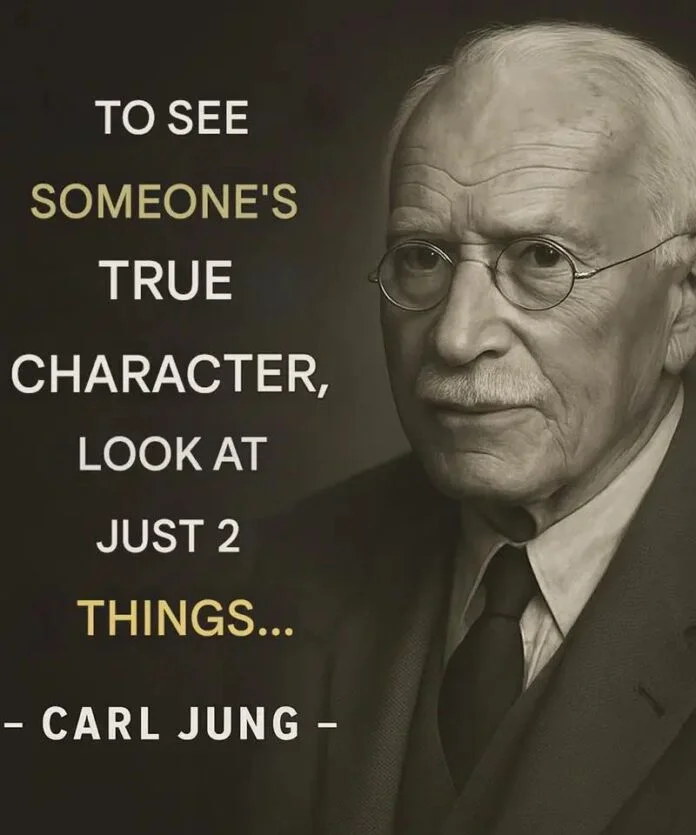For much of our lives, we meet people who seem kind, dependable, or trustworthy—at least at first glance. Yet, as time passes, we sometimes discover that what we saw on the surface wasn’t the whole story. A person’s true character often hides behind smiles, polite greetings, and carefully chosen words.
But here’s the remarkable truth: you don’t always need years to see who someone really is. With the wisdom of experience—and by knowing what to watch for—you can understand a person’s true nature in just a matter of minutes.
Carl Jung, the Swiss psychiatrist whose groundbreaking ideas shaped modern psychology, once explained that character is revealed not in the moments when we are polished and prepared, but in the everyday situations when our guard is down. According to Jung, there are two small but powerful signs that can help us uncover a person’s real nature. These insights remain just as relevant today as they were decades ago, offering timeless lessons for relationships, self-awareness, and personal growth.
Why Small Moments Matter More Than Big Ones
It’s easy to perform when life is going smoothly. Anyone can look patient when they aren’t being tested, or generous when others are watching. But real character is not about grand gestures or big declarations. It shows itself in the quiet details—the unguarded choices a person makes when there’s no audience, no reward, and no reason to pretend.
That’s why these two signs matter so deeply. They bypass appearances and words, cutting straight to the heart of who someone truly is.
1. How a Person Treats Those Who Can Offer Nothing in Return
One of the clearest indicators of character lies in how someone interacts with those who have no power over them. Think of the waiter at the restaurant, the cashier at the grocery store, the janitor cleaning the floors at night, or even a stranger asking for directions.
When a person shows kindness and respect to people in these roles, it reflects a core of empathy and integrity. It shows they don’t measure another person’s value by status or wealth, but by shared humanity.
On the other hand, when someone dismisses, insults, or ignores those they consider “beneath” them, it often reveals arrogance, insecurity, or a lack of moral depth. No matter how charming that person may appear in social circles, their treatment of the powerless tells the real story.
Older generations know this instinctively. Many of us were taught by parents or grandparents that true respect is universal. You don’t pick and choose who deserves kindness—it is offered to everyone, especially those who may not be able to give you anything back.
2. How a Person Handles Frustration and Adversity
The second powerful clue lies in how people behave when things go wrong. Life doesn’t always go according to plan—there are delays, failures, and setbacks that test us in ways comfort never could.
Do they lash out when the line is too long at the pharmacy? Do they blame the clerk when their order gets mixed up? Do they snap at loved ones when they’re tired?
Or, instead, do they stay calm, breathe, and find a constructive way forward? Do they show patience with others, even when stressed themselves? Do they acknowledge mistakes instead of shifting blame?
Jung reminded us that character isn’t revealed in times of ease—it is revealed in times of crisis. A person’s ability to stay balanced in frustration speaks volumes about their emotional maturity, humility, and self-control.
For many older adults, this rings especially true. Life has taught us that storms will always come. The question isn’t whether someone has faced challenges, but how they carried themselves through them. That, more than anything, separates resilience from fragility.
Other Subtle Clues That Speak Volumes
While these two main signs provide the strongest window into character, there are other everyday behaviors worth noticing. Over time, these small details build a more complete picture of who someone really is.
Their Sense of Humor
Laughter is revealing. The jokes someone makes—or even the jokes they laugh at—can point to their deeper feelings. Compassionate humor, which uplifts and connects, often reflects warmth and security. Sarcastic or cutting humor, on the other hand, may hint at bitterness, insecurity, or hidden hostility.
How They Speak About Others
Pay close attention to how people talk about those who aren’t in the room. Do they constantly gossip, criticize, or judge? Or do they show understanding, giving others the benefit of the doubt? People who habitually tear others down are often expressing dissatisfaction with themselves.
How Well They Listen
Genuine listening is a rare gift. A person who listens without interrupting or dominating the conversation demonstrates respect and emotional awareness. Listening is not simply about hearing words—it’s about valuing another’s presence.
How They Use Power
Perhaps one of the most revealing tests of all is how someone behaves when they are in a position of authority. Whether it’s managing employees, leading a group project, or simply being the “decision-maker” in the family, power can bring out either generosity or cruelty. Those who remain fair, humble, and considerate when in charge show that their values are rooted in integrity, not ego.
Why These Lessons Matter Now
In today’s world of social media, image often takes precedence over reality. People curate their lives with perfect photos and polished words. But character cannot be filtered or staged. It appears in how we treat others when no one is watching, and in how we react when life doesn’t go our way.
For those of us in our later years, these truths feel familiar. We’ve had decades to observe people in both their best and worst moments. Many of us can recall friendships or relationships that seemed solid until adversity revealed something different. And many of us have also seen kindness shine in unexpected places—from strangers, neighbors, or even casual acquaintances who showed decency when they didn’t have to.
The Wisdom of Experience
As we grow older, we learn to trust these quiet signals more than polished appearances. We realize that a person’s true worth isn’t measured in what they say about themselves, but in the choices they make every day.
Carl Jung’s timeless advice—look at how someone treats those who can give nothing back, and how they handle frustration—remains a compass for anyone seeking to build meaningful, trustworthy relationships.
And perhaps, it is also a reminder for ourselves. Each day, in small ways, we are revealing our own character too. Whether we show patience at the doctor’s office, gratitude to a cashier, or kindness to a neighbor, we are living examples of the values we hold most dear.
At its heart, character is about love, humility, and resilience. It is not built overnight, nor is it revealed in speeches or titles. It shines quietly, in patience shown to a stranger, in kindness offered with no expectation, and in the calm that steadies us through life’s inevitable storms.
For those who wish to truly understand others—and themselves—remember Jung’s wisdom: don’t look only at what people say or show. Look at what they do when no one is watching, and how they behave when the road gets hard.
That is where you’ll see the truth.



